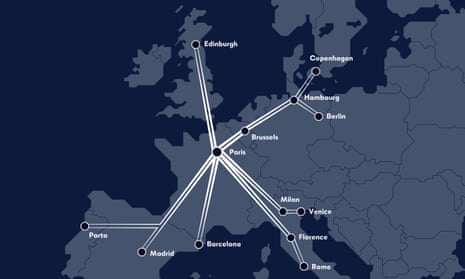Less than a decade after Europe’s night trains appeared to have reached the end of the line, a new French start-up has announced plans for a network of overnight services out of Paris from 2024.
Midnight Trains is hoping post-Covid interest in cleaner, greener travel will generate interest in its proposed “hotels on rails”, which aims to connect the French capital to 12 other European destinations, including Edinburgh.
The founders say the aim is not to match the famous – and expensive – luxury of the Orient Express but offer an alternative to the basic, state-run SNCF sleepers and short-haul flights.
Key to the service will be “hotel-style” rooms offering privacy and security, and an onboard restaurant and bar.
Three years ago, Europe’s night trains were being consigned to the economic sidings, driven out of business by low-cost flights and long-distance buses. Since then, however, public concerns over the climate emergency have led to a surge of interest in reviving night routes across the continent.
Eventually, Midnight Trains plans to serve at least a dozen destinations between 500 and 900 miles from Paris, including cities in Spain, Portugal, Italy, Belgium, Germany, Denmark and Scotland.
The final list will be confirmed after agreements have been reached over leasing either new or second-hand rolling stock and the use of rail networks in France and destination countries.
The company is funded by French entrepreneurs, including the telecoms billionaire Xavier Niel, co-owner of Le Monde newspaper.
Midnight Trains co-founder Adrien Aumont, also co-founder of the crowdfunding platform KissKissBankBank, says his interest in sleeper trains was kindled by both professional and personal reasons.
“I noted that people around me don’t want to get on a plane because of concerns about carbon emissions, but also my girlfriend is afraid of flying and decided she was never getting on a plane. I realised the only way travel was going to be possible was by train,” said Aumont.

“At the moment there is no alternative for medium-distance travel [other] than flights or a bad night train. And the only way we can rival planes is to reinvent the train experience.
“People want intimacy,” said Aumont. “They don’t want to be sharing a sleeping space with a stranger. They want privacy, security and a good quality bed. By offering a bar and restaurant we are also offering conviviality and a certain art de vivre.
“What we aim to do is to make people who want to travel in Europe hesitate to take the plane, to make a 90-minute flight a thing of the past.”
Aumont was reluctant to give ticket prices, but said these would be competitive with that of a short-haul flight, including what he called the “hidden costs”.
“This includes what you would have to pay for baggage and things like taxis to and from the airport,” he said.
Midnight Trains is the latest arrival in what is becoming a crowded market. Across Europe, state-run railways are facing new competition from private operators looking to introduce night trains. Fans of rail travel have waited some time for new night train routes to come along … only to find, a bit like buses, several turning up at the same time.
The Sustainable and Smart Mobility Strategy, published by the European Commission in December 2020, calls for a major shift in passengers to rail, including night trains.
Since 2016, Austrian Federal Railways (ÖBB) has introduced six new overnight routes under the Nightjet brand that was already operating nine night routes. Private operators in the Czech Republic, the Netherlands and Belgium have announced new overnight services.
In December last year, ÖBB, the German rail company Deutsche Bahn, SNCF and Swiss Federal Railways (SBB) announced the signing of an agreement to launch new night train services in Europe. This is the first step in developing the Trans-Europe Express (TEE) 2.0 network, proposed by the German presidency of the Council of the European Union. This partnership plans to launch four new services to 13 of Europe’s largest cities in the coming years.
In the International Railway Journal, David Burroughs wrote: “A return to the golden era of night trains in Europe is not going to be easy. But if operators are able to fully develop attractive services to meet the growing demands from passengers, while overcoming the major challenges they face, it could mark the start of a major new era in the post-pandemic world, and offer a major boon for the rail sector.
Burroughs added: “Climate change will not be solved overnight, but moving from plane to train is widely understood to play an important role in reducing transport emissions, and night trains could contribute to this change.”
